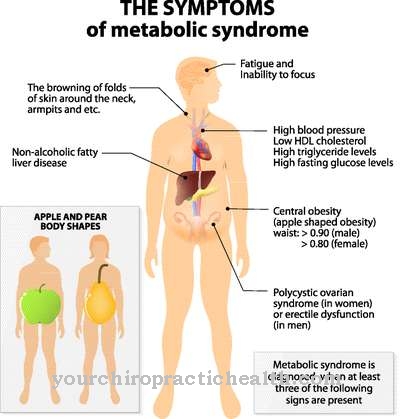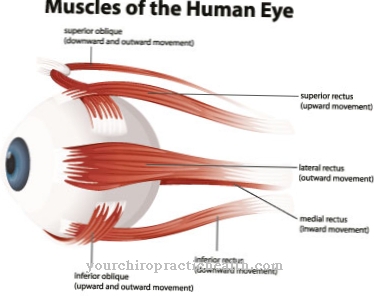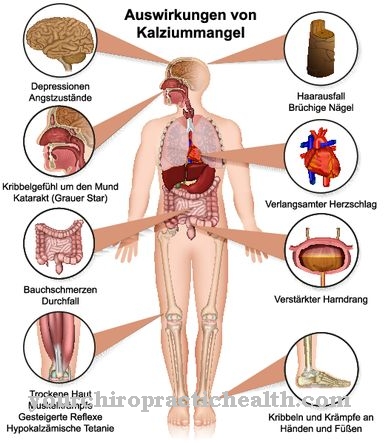A Insect venom allergy or Insect allergy or sometimes Wasp allergy is mostly released in summer, late summer and sometimes (in warm temperatures) in autumn by a wide variety of insects. Not everyone is naturally allergic to these insect bites. However, whoever is is exposing himself to a health risk. Since the wasp venom or bee venom can cause life-threatening symptoms and complaints in some allergy sufferers, an allergy test should be carried out in good time with a doctor in order to protect oneself against an insect venom allergy by taking preventive measures if necessary.
What is an insect venom allergy?

At a Insect venom allergy people are allergic to the sting of a bumblebee, wasp, bees, hornets or other similar insects. If one of the mentioned insects feels threatened, the animals defend themselves with their sting, whereby the respective insect venom is injected under the skin and in the worst case can trigger an insect venom allergy.
Furthermore, there are also people who develop an insect venom allergy from an ant bite. An insect venom allergy is an overreaction to the ingredients contained in the venom. A native insect bite is usually harmless to ordinary people. Normally, an insect venom allergy only becomes noticeable after a repeated bite.
causes
The cause of the Insect venom allergy is the sting of a poisonous insect. People who suffer from an insect venom allergy are primarily allergic to the venom of wasps and bees. The stings from the great knot ant and bumblebees, on the other hand, cause a corresponding insect venom allergy far less often. In honey bees, only the females are able to cause an insect venom allergy with a sting.
In contrast to most other forms of allergy, genetic predisposition probably does not play a major role in the development of an insect venom allergy. Various ingredients contained in the poison, which vary from insect species to insect species, are responsible for the allergic reaction. However, there are very many people who are overly sensitive to both bee and wasp stings, as two substances responsible for insect venom allergy occur in the venoms of both insect species.
Hornet venom has roughly the same allergenic composition as wasp venom. However, since hornets sting far less frequently, an insect venom allergy is also much rarer.
Symptoms, ailments & signs
With an insect venom allergy, swelling develops in the area of the insect bite, which is usually itchy and red around the bite. These symptoms are usually harmless and go away within a day. More serious is the body's allergic reaction to the allergen. An allergic shock can affect the entire organism and in particular the respiratory tract, cardiovascular system and gastrointestinal tract.
In the area of the respiratory tract, swallowing and speaking difficulties, runny nose, shortness of breath and swelling can occur. Red, watery and itchy eyes are also typical. In the circulatory system, palpitations, shortness of breath and dizziness set in, often accompanied by anxiety states and panic attacks.
Symptoms such as nausea, vomiting and abdominal cramps occur in the gastrointestinal tract. The exact symptoms and complaints that occur depend on the type of allergen and the duration of treatment. If the poison is removed immediately, the symptoms subside after a few days, while serious complications can occur with a severe course, which sometimes also have long-term consequences. In extreme cases, the allergy sufferer falls into a coma after a bite or suffers a heart attack. The first signs of an impending loss of consciousness are dizziness, impaired vision and difficulty breathing.
Course of disease
In the Insect venom allergy one differentiates five different degrees with regard to the course of the disease. At grade 0, there is a local swelling that is larger than the area of a hand. Grade I insect venom allergy manifests itself in a mild general reaction, usually generalized hives, with nausea, anxiety and itching. In the case of grade II insect venom allergy, the symptoms known from grade I can occur as well as lip swelling, shortness of breath, abdominal pain, vomiting, nausea, diarrhea, dizziness and tightness in the chest.
Severe general reactions are to be expected with grade III insect venom allergy. In addition to the symptoms of grade II, difficulties in swallowing, slurred speech, a feeling of weakness, drowsiness, hoarseness and fear of death can also be the consequences of insect venom allergy. The most severe form of the insect venom allergy is the shock reaction with an additional blue coloration of the lips, an unavoidable loss of urine or stool, unconsciousness, drop in blood pressure and a collapse (anaphylactic shock). Up to 20 people die each year in Germany alone from the causes of an insect venom allergy.
Complications
In the worst case, an insect venom allergy can lead to death if it is severe and no medical treatment is given after the insect bite. If contact with insects is avoided, however, the insect venom allergy does not lead to any further complaints or complications. Should a sting occur, most patients will suffer from various symptoms.
There is swelling and burning pain at the injection site. Itching also occurs and the person affected can suffer from shortness of breath. It is not uncommon for a circulatory shock to occur and the person affected can lose consciousness. Those affected often suffer from dizziness and anxiety, with panic attacks not uncommon. There is a tightness in the chest and often pain in the abdomen.
For this reason, treatment should always be carried out after an insect bite so that there is no irreversible consequential damage. The treatment itself takes place with the help of medication and does not lead to further complaints or complications. With early treatment, the life expectancy of the person affected is not affected by the insect venom allergy.
When should you go to the doctor?
An insect venom allergy can be life-threatening, so it is better for those affected to see a doctor too often than too little, especially if there are accompanying symptoms such as severe reddening of the bite, itching and wheals after an insect bite. An allergic reaction can also include swelling of the face and neck, often accompanied by shortness of breath. In the event of a sting in the mouth, a doctor must be consulted immediately. If, after an insect bite, your eyes water, your throat scratches, your nose runny, symptoms such as dizziness, rapid heartbeat, tight chest, nausea, vomiting, swallowing and speech problems and even impaired consciousness, you must call an emergency doctor signs of allergic shock. An allergic shock is life-threatening and can lead to circulatory failure with respiratory failure.
People who suffer from an already diagnosed insect venom allergy usually carry an emergency kit with them. You should always carry this with you and inform people around you about what to do in an emergency. Possibly. the doctor may also perform immunotherapy to desensitize them.
Treatment & Therapy
The Insect venom allergy can be diagnosed using a blood and skin test. If the symptoms mentioned occur after an insect bite, an allergist should be consulted immediately, as an insect venom allergy can be fatal under certain circumstances. If an insect venom allergy is known, the person affected should always carry a liquid cortisone preparation, a liquid antihistamine and adrenaline as a pre-filled syringe or spray with him in his own interest.
Furthermore, an insect venom allergy can be treated with immunotherapy. Such a desensitization in the case of an insect venom allergy usually extends over three to five years. The success rate is around 90 percent. With rapid immunotherapy, however, the desired desensitization can be achieved after a few days or weeks. Such a rapid method, however, requires constant monitoring by an allergist, since the risk of anaphylactic shock in the case of an insect bite allergy is very high.
Aftercare
Individuals with an insect venom allergy require appropriate follow-up care. Various measures can be taken immediately after the shock treatment, depending on the type and severity of the allergy. After an allergic shock, which occurs as a result of an as yet undiagnosed insect venom allergy, the patient is usually referred to an allergist who will take care of the treatment and take further measures.
The doctor observes the course of the disease and can issue an allergy passport for newly diagnosed allergy sufferers. With the help of the passport, the patient can be given a suitable drug quickly in an emergency. This emergency medication must be prescribed as part of follow-up care. The allergist also informs the patient about immunotherapy. The so-called VIT treatment makes the body tolerant of insect venom.
Finally, a change in lifestyle is part of the aftercare. Allergy sufferers should strictly avoid contact with insects and ensure that emergency medication and allergy passport are always at hand. Affected children should be informed by their parents about the risks and safety measures. Secondary and tertiary prevention minimizes the risk of a new allergic shock. Follow-up care should be carried out by the allergist, family doctor or another appropriate specialist.
Outlook & forecast
The prognosis of an insect venom allergy is usually favorable. The intensity, the extent of the insect venom allergy and the state of health of the person affected are decisive for the further course.
In the case of very slight symptoms of poisoning, self-help measures are often sufficient to alleviate the symptoms. The removal of an insect sting and the suction of the poison can already be sufficient to bring about relief from the symptoms. In these cases, recovery can be expected after the wound has healed.
As the severity of physical impairments and health disorders increases, the need for medical care is necessary. With quick and professional treatment, there is an improvement within a short time. Usually, symptoms are completely free within a few days. Medical care should be provided immediately, as it is difficult to predict which physical reactions the allergy will lead to, especially in the case of allergy sufferers.
In individual cases, an allergic shock reaction can occur.This harbors a potential danger to life and therefore indicates a particularly unfavorable course of the disease. Since there is a possibility of a life-threatening development, consultation with a doctor is necessary as soon as the first severe irregularities or the increase in symptoms occur. If the person concerned is hyposensitive, the risk of anaphylactic shock increases. Without special protective measures and adequate precautions, an emergency situation threatens.
You can do that yourself
If you have an insect venom allergy, you should first see a doctor. The doctor will first diagnose the allergy and then issue the person concerned with an allergy ID card. This should always be worn - as well as the emergency kit with cortisone, adrenaline and co. However, you should primarily try to avoid contact with insects.
Desensitization is recommended for patients who are exposed to an increased risk of insect bites because of their job or their living conditions. When walking outdoors, it is important to avoid "seductive" places for wasps, bees and the like. In addition, long, light-colored, tight-fitting clothes and closed shoes should be worn. It is best to install an insect screen at home. Special fragrances from the pharmacy that drive away the insects can be placed on the doors and windows.
If, despite all precautionary measures, an insect bite should occur, first aid must be provided immediately. First the sting must be removed, then the puncture site should be cooled and covered. If you have a severe allergy, you should call the emergency doctor and use the emergency medication you have brought with you. The German Allergy and Asthma Association offers further helpful tips.


.jpg)









.jpg)



.jpg)










.jpg)
